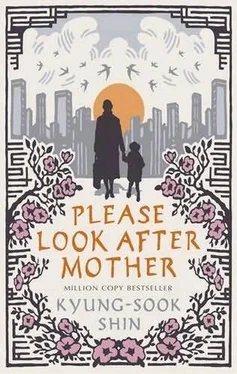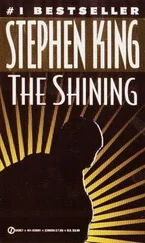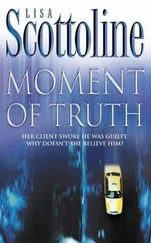“Sir, you said the Yongsan 2-dong office, right?” the taxi driver asks him, turning in front of the university toward Yongsan High School, but Hyong-chol doesn’t register the question.
“Sir?”
“Yes?”
“You said the Yongsan 2-dong office, right?”
“Yes.”
He walked this street every day when he was twenty but the scenery outside the car window is foreign to him. He wonders if this is the right way. It would actually be more jarring if the district hadn’t changed at all in thirty years.
“Since it’s Saturday, the office is probably closed.”
“I guess that’s right.”
The taxi driver is about to say something else, but Hyong-chol takes out a flyer from his pocket and pushes it toward him. “If you see someone like this while you’re driving around, please let me know.”
The driver glances at the flyer. “Is this your mother?”
“Yes.”
“How terrible…”
Last fall, he didn’t do anything even though his sister called to say that Mom was acting strangely. He thought that, at her age, Mom would have ailments and illnesses. His sister ruefully told him that Mom seemed to be fainting from her headaches, but when he called home Mom answered warmly, “Hyong-chol!” When he asked, “Is anything going on?” Mom laughed and said, “I wish there was something going on! Don’t worry about us. What would be going on with two old folks like us? Take care of yourselves.”
“Come visit us in Seoul.”
Mom said, “Okay, we will,” and trailed off. His sister, angry at his indifference, came to his office and shoved into his hands a scan of Mom’s brain. His sister related the doctor’s words that a stroke had occurred in Mom’s brain without her realization. When he listened placidly, she said, “Hyong-chol! Are you really Yun Hyong-chol?” and stared into his eyes.
“She said nothing was going on, so what’s all this?”
“You trust her? Mom always says that. That’s Mom’s mantra. You know it’s true. You know she’s just saying that because she feels guilty about being a burden to you.”
“Why does she feel guilty?”
“How would I know? Why do you make her feel guilty?”
“What did I do?”
“Mom’s been saying that for a long time. You know she has. Let me ask you, why in the world does Mom feel guilty when it comes to you?”

Thirty years ago, after he passed the fifth-level civil-service exam, the first placement he received was at the Yongsan 2-dong office. In high school, when he didn’t get into any university in Seoul, Mom couldn’t believe it. For her it was an obvious reaction. From the early days of elementary school through high school, he had always been the best student in his class. Until he failed to get into college, he had always placed first, no matter which test he took. When he was in sixth grade, he got the best score in the middle-school entrance exam, which allowed him to attend school tuition-free. For three straight years, he was the best student at school, so he never had to pay a cent. He was admitted to high school as the first in his class. “I wish I could pay my Hyong-chol’s tuition at least once,” Mom would exclaim in pride. It was hard for her to understand how someone who was the top student throughout high school didn’t pass the college entrance exam. When they heard that he not only failed to pass at the top but didn’t make it at all, Mom was puzzled. “If you can’t pass, who can?” she asked herself. He had been planning to study hard in college to remain at the top of his class. It wasn’t really a plan-it was his only option. The only way he could go to college was on scholarship. But because he didn’t pass, he had to find another path. He didn’t have the luxury even to consider retaking the test the following year, and he soon figured out what to do: he took two civil-service exams and passed both. He left home, taking the first assignment he received. And a few months later, he learned that there was a night law college in Seoul and decided to apply for it. He realized that he needed his high-school graduation certificate. If he sent a letter asking for a copy and waited for it to come by mail from the countryside, it would arrive after the application was due. So he wrote a letter to his father, requesting that he go to the bus terminal with a copy of the certificate and ask someone coming to Seoul to take it for him. He asked his father to call him at work after doing that-if his father could tell him what time the bus was due to arrive, he would go to the terminal and get the certificate from the person carrying it. He waited and waited, but there was no phone call. In the middle of the night, as he was wondering what he could do about the application, which was due the next day, someone banged on the door of the office, where he was living at the time. The employees had to take turns for night duty, but since he didn’t have a place to stay, it was decided that he would live in the night duty room: he was on duty every night. The banging went on as if it would break down the door; when he went out, a young man stood in the darkness.
“Is this your mother?”
His mom was standing behind the young man, shivering in the cold. Before he could say anything she said, “Hyong-chol! It’s me! Mom!” The young man looked at his watch and said, “There’s only seven minutes until the curfew!” and, turning to Hyong-chol’s mom, said “Goodbye!” and ran into the darkness to beat the government-imposed deadline.
Father had been away from home. When Hyong-chol’s sister read Mom his letter, Mom fretted, then went to his high school and got a copy of his graduation certificate and hopped on the train. It was the first time in her life that she’d ridden a train. That young man had seen Mom at Seoul Station asking people how to get to Yongsan-dong. Hearing her say that there was something she absolutely had to get to her son that night, he was compelled to bring her to the office himself. Hyong-chol’s mom was wearing blue plastic sandals in the middle of winter. During fall harvest, she had hurt her foot, near her big toe, with a scythe, and because it hadn’t fully healed, the plastic sandals were the only shoes she could wear. His mom left her sandals outside the night duty room before entering. “I don’t know if it’s too late!” she said, and took out his graduation certificate. Mom’s hands were frozen. Grasping them, he vowed to himself that he would make these hands and this woman happy, no matter what. But a rebuke tumbled out of his mouth, asking her how she could follow a stranger just because he told her to. Mom scolded him right back: “How can you live without trusting people? There are more people who are good than people who are bad!” And she smiled her typical optimistic smile.

He stands in front of the closed office and studies the building. Mom couldn’t have come here. If she could figure out how to get here, she could have gone to one of her children’s places. The woman who said she had seen his mom here remembered her because of her eyes. She said his mom was wearing blue plastic sandals. Blue plastic sandals. He remembers just now that the shoes Mom had on when she went missing were low-heeled beige sandals. Father had told him. But the woman who had told him that Mom’s sandals had cut into her foot because she had walked so far had definitely said that they were blue. He peers into the office, then looks around the streets leading to Posong Girls’ High School and Eunsong Church.
Does the night duty room still exist in that office?
That night duty room was where he slept next to Mom all those years ago, sharing a blanket. Next to the woman who had boarded the Seoul-bound train without a plan, to bring a graduation certificate to her son. That must have been the last time he had lain next to Mom like that. A chilly draft seeped in, in waves from the wall facing the street. “I can fall asleep better if I’m next to the wall,” Mom said, and switched sides with him. “It’s drafty,” he said, and got up to stack his bag and books next to the wall, to block out the wind. He piled the clothes he had been wearing that day next to the wall, too. “It’s fine,” Mom said, pulling him by the hand. “Go to bed; you have to get up for work tomorrow.”
Читать дальше













